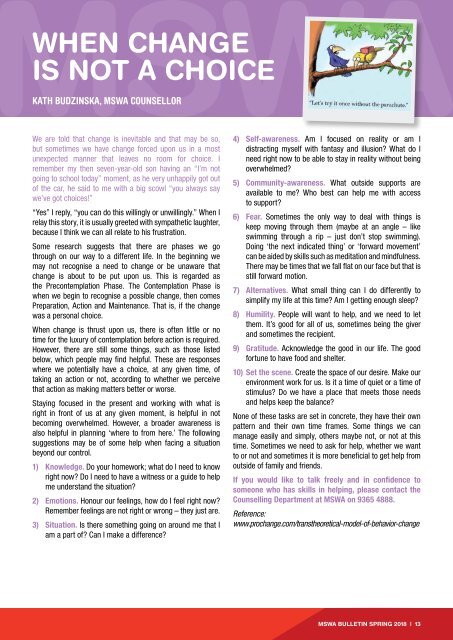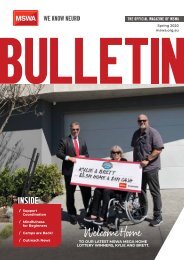You also want an ePaper? Increase the reach of your titles
YUMPU automatically turns print PDFs into web optimized ePapers that Google loves.
WHEN CHANGE<br />
IS NOT A CHOICE<br />
KATH BUDZINSKA, MSWA COUNSELLOR<br />
We are told that change is inevitable and that may be so,<br />
but sometimes we have change forced upon us in a most<br />
unexpected manner that leaves no room for choice. I<br />
remember my then seven-year-old son having an “I’m not<br />
going to school today” moment, as he very unhappily got out<br />
of the car, he said to me with a big scowl “you always say<br />
we’ve got choices!”<br />
“Yes” I reply, “you can do this willingly or unwillingly.” When I<br />
relay this story, it is usually greeted with sympathetic laughter,<br />
because I think we can all relate to his frustration.<br />
Some research suggests that there are phases we go<br />
through on our way to a different life. In the beginning we<br />
may not recognise a need to change or be unaware that<br />
change is about to be put upon us. This is regarded as<br />
the Precontemplation Phase. The Contemplation Phase is<br />
when we begin to recognise a possible change, then comes<br />
Preparation, Action and Maintenance. That is, if the change<br />
was a personal choice.<br />
When change is thrust upon us, there is often little or no<br />
time for the luxury of contemplation before action is required.<br />
However, there are still some things, such as those listed<br />
below, which people may find helpful. These are responses<br />
where we potentially have a choice, at any given time, of<br />
taking an action or not, according to whether we perceive<br />
that action as making matters better or worse.<br />
Staying focused in the present and working with what is<br />
right in front of us at any given moment, is helpful in not<br />
becoming overwhelmed. However, a broader awareness is<br />
also helpful in planning ‘where to from here.’ The following<br />
suggestions may be of some help when facing a situation<br />
beyond our control.<br />
1) Knowledge. Do your homework; what do I need to know<br />
right now? Do I need to have a witness or a guide to help<br />
me understand the situation?<br />
2) Emotions. Honour our feelings, how do I feel right now?<br />
Remember feelings are not right or wrong – they just are.<br />
3) Situation. Is there something going on around me that I<br />
am a part of? Can I make a difference?<br />
4) Self-awareness. Am I focused on reality or am I<br />
distracting myself with fantasy and illusion? What do I<br />
need right now to be able to stay in reality without being<br />
overwhelmed?<br />
5) Community-awareness. What outside supports are<br />
available to me? Who best can help me with access<br />
to support?<br />
6) Fear. Sometimes the only way to deal with things is<br />
keep moving through them (maybe at an angle – like<br />
swimming through a rip – just don’t stop swimming).<br />
Doing ‘the next indicated thing’ or ‘forward movement’<br />
can be aided by skills such as meditation and mindfulness.<br />
There may be times that we fall flat on our face but that is<br />
still forward motion.<br />
7) Alternatives. What small thing can I do differently to<br />
simplify my life at this time? Am I getting enough sleep?<br />
8) Humility. People will want to help, and we need to let<br />
them. It’s good for all of us, sometimes being the giver<br />
and sometimes the recipient.<br />
9) Gratitude. Acknowledge the good in our life. The good<br />
fortune to have food and shelter.<br />
10) Set the scene. Create the space of our desire. Make our<br />
environment work for us. Is it a time of quiet or a time of<br />
stimulus? Do we have a place that meets those needs<br />
and helps keep the balance?<br />
None of these tasks are set in concrete, they have their own<br />
pattern and their own time frames. Some things we can<br />
manage easily and simply, others maybe not, or not at this<br />
time. Sometimes we need to ask for help, whether we want<br />
to or not and sometimes it is more beneficial to get help from<br />
outside of family and friends.<br />
If you would like to talk freely and in confidence to<br />
someone who has skills in helping, please contact the<br />
Counselling Department at MSWA on 9365 4888.<br />
Reference:<br />
www.prochange.com/transtheoretical-model-of-behavior-change<br />
MSWA BULLETIN SPRING <strong>2018</strong> | 13


















